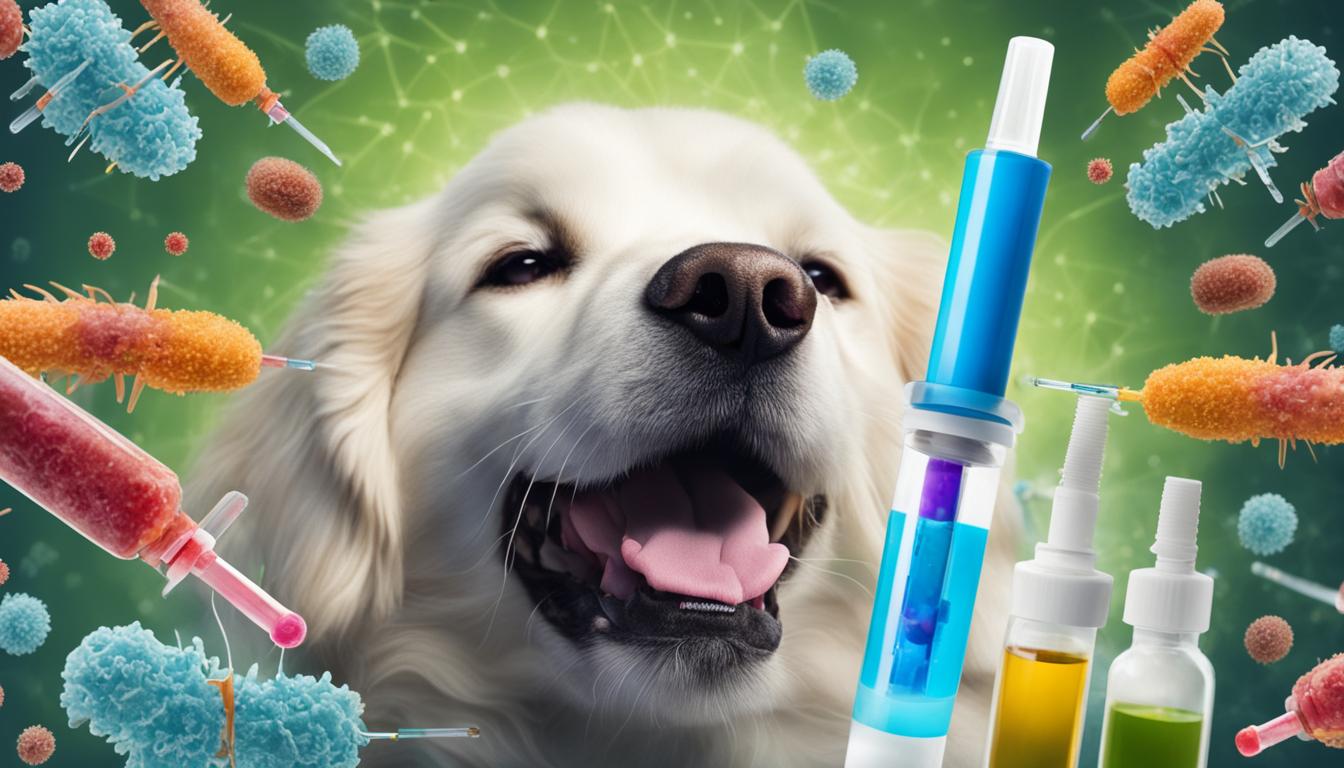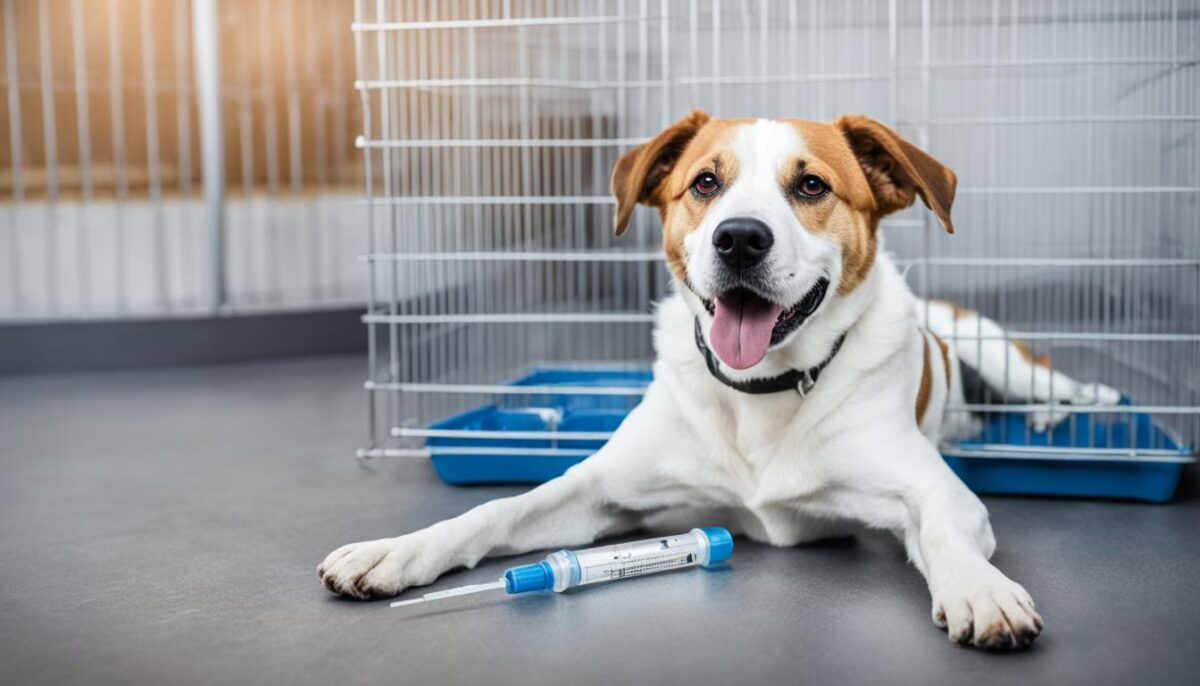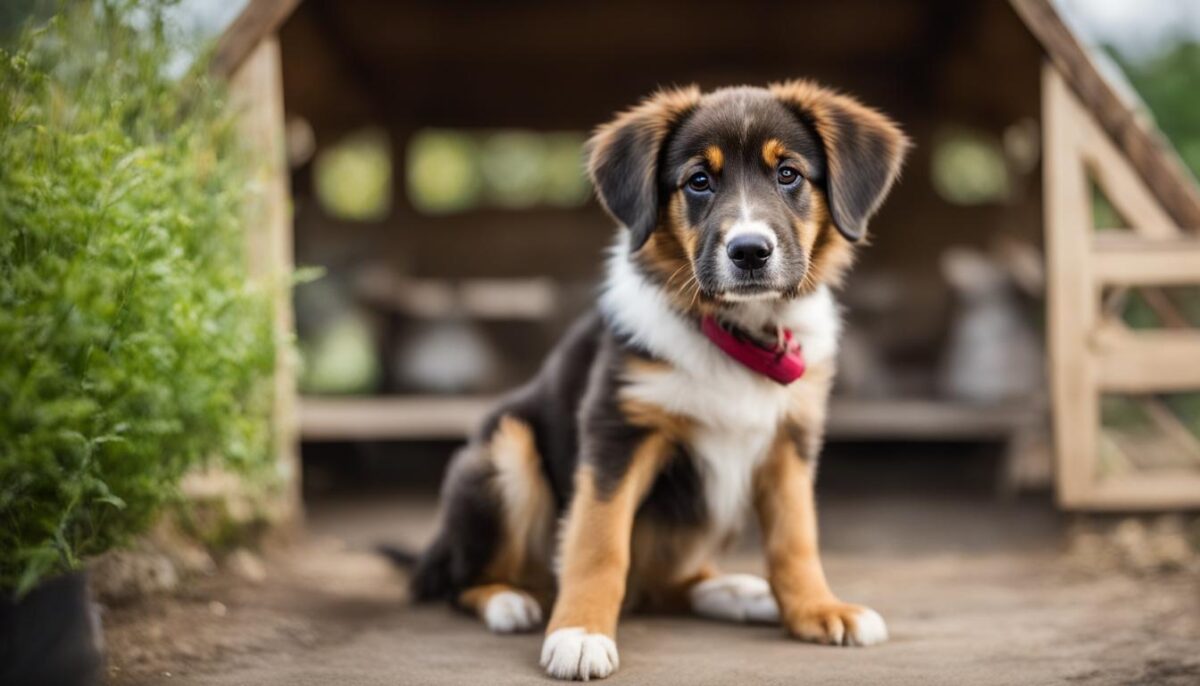Here’s something you might worry about as a pet parent: can your furry friend still get sick from kennel cough even after getting the Bordetella vaccine? Kennel cough in dogs is like a cold for us – they get a cough, maybe feel lousy, and usually, with a little care, they’re back to their perky selves. Now, dogs love hanging out with other dogs, right? But just like kids at school, that’s how they spread germs. That’s where canine vaccines come in. They help your dog stay healthy, even when they’re playing with their pals. But sometimes, even with the vaccine, dogs might still get a mild version of kennel cough. Don’t worry, though; it’s not usually a big deal. They get a bit of a cough, maybe a sneeze, and then they’re good to go. So, keeping up with their shots, like the Bordetella vaccine, is super important for helping them dodge any nasty respiratory illnesses in pets.
Key Takeaways
- Bordetella vaccine helps keep dogs safe from kennel cough.
- Canine vaccines protect pets from getting really sick.
- Kennel cough in dogs is like us getting a cold.
- Even with a vaccine, dogs can still get a small cough.
- Keep up with your pet’s shots to protect them from illnesses.
What Kennel Cough Is and How It Affects Dogs
Imagine your pup having a nasty cough that doesn’t go away. That could be kennel cough, which is a kind of canine upper respiratory infection. It’s like when you catch a cold and keep coughing, only it’s for dogs. Many germs cause kennel cough, but the main one is a bug named Bordetella bronchiseptica.
This illness makes your dog’s throat and breathing tubes red and sore, leading to a loud cough. It’s really catchy, which means dogs can give it to each other easily when they play or stay together.
Mostly, kennel cough isn’t deadly, but it’s not fun either. Sometimes, especially in little puppies or older dogs that aren’t very strong, it can turn into a very bad lung problem. That’s why vets tell us to give our furry friends a vaccine called Bordetella, which helps stop them from getting very sick.
Let’s look at what can happen if dogs get kennel cough and why keeping them healthy matters. We will see why it’s important to know about kennel cough symptoms and dog health to keep our pets happy.
- Cough that sounds like a honk
- Sneezing and runny nose
- Not wanting to play or eat much
- Slight fever
These signs tell us that we need to take care of our dogs and help them get better. Pet diseases can make our buddies feel yucky and can make us worry a lot, so it’s best to keep an eye out for any coughs or sneezes and take them to the vet if we need to.
Can a Vaccinated Dog Get Kennel Cough
Wondering if your pooch is protected after getting a shot? Let’s dig into how vaccines work for something like kennel cough and see if your furry friend is safe.
Understanding Live Versus Killed Vaccines
So, what’s the deal with these shots? Well, there are two main types: live and killed vaccines. Live ones use a weakened version of the germ to get your dog’s body to learn how to fight it. Killed ones have germs that aren’t alive at all. They can’t make your dog sick, but they help your dog’s body learn what to look out for.
How Vaccination Can Lead to Mild Symptoms
Sometimes, after a shot, your dog might act a bit under the weather. This is pretty normal and shows that your pup’s body is building up defenses. These might include a runny nose or a bit of a cough. But don’t worry — it’s much better than getting the real deal of kennel cough!
The Bordetella Vaccine’s Role in Disease Prevention
The Bordetella vaccine is kind of a shield for dogs against kennel cough. While it’s super important, it’s not a magician. It targets the Bordetella bacteria, but kennel cough can come from other germs too. Still, this shot really helps in not letting the cough get too bad and keeping it from spreading to other dogs.
| Vaccine Type | What it Does | Common Reactions | Why Your Dog Needs It |
|---|---|---|---|
| Live Vaccines | Fights off actual live germs | Runny nose, cough | Stronger defense training |
| Killed Vaccines | Introduces non-living germs | Rarely causes symptoms | Protection without the side effects |
In a nutshell, vaccines are like a practice run for your dog’s body. They show the immune system a sneak peek of what to look out for, so if the real baddie comes around, your pup’s ready to go. And while we hope they never have to use this training in real life, getting that Bordetella shot will make things a lot easier if kennel cough comes knocking.
Identifying Symptoms of Kennel Cough in Vaccinated Dogs
As a careful pet owner, you want to keep your furry friend healthy. Knowing about respiratory signs in dogs helps you look after them better. Let’s talk about kennel cough detection and what it means for vaccinated dog health.
Even if your dog has had their shots, they can still show mild signs of kennel cough. It’s like how sometimes people get a tiny bit sick even when they’ve had a flu shot. Your dog might cough, sneeze, have a runny nose, seem tired, or have a small fever. These are all part of pet healthcare you should know about.
| Symptom | What You Might See or Hear | What to Do |
|---|---|---|
| Cough | A dry sound, like they have something stuck in their throat | Check if it sounds different than normal barking or coughing |
| Sneezing | More sneezing than usual | Watch for other unusual behaviors or more sneezes |
| Runny Nose | Wet nose with more gooey stuff than usual | Keep their nose clean and watch if it stops |
| Lethargy | Not wanting to play or move around much | Make sure they are eating and drinking well |
| Low Fever | Warmer than normal body and less energy | Check if they feel hot and call the vet if you’re worried |
Usually, these signs are just your dog’s body reacting a bit to the vaccine, especially if it was a live vaccine. This is normal and means the vaccine is teaching your dog’s body how to fight the real germs. But if you feel something isn’t right, or if your dog doesn’t feel better after a few days, it’s smart to talk to your vet. They can help make sure your dog is happy and well!
Remember, your dog relies on you to keep an eye on their health. By knowing the signs and what to look for, you can help your dog stay playful and energetic.
Treating Kennel Cough Symptoms Post-Vaccination
When your furry friend has just been vaccinated but still shows signs of kennel cough, you might worry about what to do next. Let’s explore simple home remedies and professional care to support your pet’s recovery and maintain their health after vaccination.
Home Remedies to Alleviate Your Dog’s Discomfort
Sometimes, your four-legged buddy might get a mild cough after a shot. But don’t worry! There are easy things you can do at home to help them feel better. Using a harness instead of a collar can be gentler on their throat. Adding a little moisture to the air with a humidifier can also soothe their cough. And, some pet owners find that giving their dogs supplements like echinacea and vitamin C can support their immune system.
When to Seek Veterinary Care
If those soft coughs turn into something more serious or won’t go away, it’s time for expert help. Your vet has special medicines like cough suppressants and even antibiotics for tougher infections. They know all about kennel cough treatment and can make sure your pup gets back to tail-wagging health in no time.
Understanding Vaccine Efficacy and Timing
Knowing when your dog needs their shots is key to keeping them from getting sick. Most dogs need a booster shot every six months to keep them safe from kennel cough. Keep a calendar for your dog’s vaccine dates just like you would for your own important events—it’s a big part of post-vaccination care.
Remember, keeping up with your dog’s health includes paying attention to how they feel after their vaccines. If they show any signs of kennel cough, use these pet recovery tips to help them bounce back quickly. Your furry friend counts on you for their well-being, so stay alert to their needs after vaccination!
| Symptoms | Home Remedies | Seek Vet Care |
|---|---|---|
| Mild Cough | Humidifier, Harness vs Collar, Immune Supplements | If symptoms persist or worsen after using home remedies |
| Runny Nose | Keep them hydrated, Wipe nose gently | |
| Lethargy and Low Fever | Keep them warm, Ensure rest |
Potential Risks and Side Effects of the Kennel Cough Vaccine
When it comes to keeping your pet safe, you might have heard about vaccine risks and immunity issues in pets. It’s true that while vaccines help, they also have some side effects. The Bordetella vaccine is one such shot given to pets to protect against kennel cough. However, like all pet vaccinations, it can have some Bordetella vaccine side effects too.
Side Effects Versus Actual Infection
Most pets handle vaccines really well, but some can have side effects. These side effects are signs that the vaccine is working and your pet’s body is building protection. It’s normal for them to feel a bit tired, have a slight fever, or even cough a bit. But don’t worry, this doesn’t mean they’re sick with kennel cough!
Vaccination Protocol for At-Risk Dogs
If your furry friend has had a tough time with vaccines before, or if they are not in tip-top shape, your vet might suggest a special plan for them. This might mean they get their shots a bit differently or at a different time. Always talk to your vet if you have worries about vaccines, so they can help you decide what’s best for your pet.
Remember, giving your pet the Bordetella vaccine is way better than them getting really sick with kennel cough. Vaccine side effects are usually nothing to worry about, but if your pet seems really under the weather, it’s always a good idea to check in with your vet!
Prevention Strategies Beyond Vaccination
As a pet owner, you play a big role in disease prevention in pets. There are simple steps you can take to help keep your furry friend from getting sick with kennel cough. Let’s dive into how you can make your pet’s space super clean and their body strong!
Environmental Controls to Reduce Disease Spread
First things first, keeping your pet’s home clean is super important. This is more than just sweeping and mopping; it’s about making sure everything they touch is germ-free. Kennel cough avoidance can be much easier when we regularly clean and disinfect not only their kennels but also their bowls and toys! It’s also a good idea to give your pet lots of space and avoid areas where lots of dogs gather if you hear about any sickness going around.
Strengthening Your Dog’s Immune System Through Nutrition
Now, let’s chat about food – not just any food, but immune-boosting diets for dogs. Just like how eating our fruits and veggies make us strong, the right diet can do the same for dogs. Foods that are full of protein and have extra vitamin C can help your dog’s body fight off germs. Here’s a table with some top-notch foods that could give your dog an immune boost:
| Healthy Foods for Dogs | Why It’s Good |
|---|---|
| Lean meats | Packed with protein to build muscle and immune cells |
| Carrots | Full of vitamins for a strong body defense system |
| Broccoli | Great for detox and full of antioxidants |
| Blueberries | Nature’s candy with a punch of immune support |
Remember, keeping your pet healthy is a team effort. Along with these tips, always keep up with their vet check-ups and listen to their advice. You’ve got this, and your pet will surely thank you for it!
Conclusion
If you’re a dog owner, knowing all about the Bordetella vaccine is super important. This shot helps keep your furry friend from getting a cough that spreads super easily between pups. Even though your dog can still get a mild cough after the vaccine, it’s way better than getting really sick. That’s why veterinarians say it’s smart to give your dog this vaccine, especially if they hang out with other dogs a lot.
Being aware of your dog’s health is a big deal. You should look out for signs of coughing or feeling under the weather and get help from a vet if needed. Keep up with your dog’s shots and check-ups to make sure they stay happy and well. This includes the Bordetella vaccine and others that help protect against different sicknesses.
Remember, it’s your job to keep your dog safe and healthy. This means learning about what makes dogs sick and how to stop it from happening. Taking care of your dog right means lots of love and fun times together. So, keep on being a great pet parent by getting the right vaccines and making smart choices for your dog’s health!
FAQ
What is the Bordetella vaccine, and why is it important for my dog?
The Bordetella vaccine is designed to protect dogs from kennel cough, which is a highly contagious respiratory illness. It’s particularly important for dogs that are frequently in contact with other dogs, such as in kennels, dog parks, or daycare facilities. The vaccine helps to reduce the severity of symptoms and lower the chance of transmission.
Can dogs still get kennel cough even if they are vaccinated?
Yes, vaccinated dogs can still contract kennel cough, but the symptoms are usually milder compared to those of unvaccinated dogs. This is because the Bordetella vaccine primarily protects against the Bordetella bacteria, one of the main causes of kennel cough, but not all the viral components of the disease.
What are the differences between live and killed vaccines for kennel cough?
Live vaccines contain a weakened form of the disease-causing organism and often elicit a stronger immune response. They’re usually administered intranasally and can cause mild symptoms as a reaction. Killed vaccines, on the other hand, contain an inactivated form of the bacteria and might cause fewer symptoms, but they may also be less effective in some cases.
How can I detect kennel cough symptoms in my vaccinated dog?
Look for signs such as persistent cough, sneezing, runny nose, lethargy, and a low fever. Symptoms in vaccinated dogs may appear milder. If you notice these signs, especially if they persist or worsen, contact your veterinarian for advice and potential treatment.
What home remedies can I use to alleviate my dog’s kennel cough symptoms?
For mild symptoms, you can try using a harness instead of a collar to avoid putting pressure on the trachea, using a humidifier to moisten the air, and adding immune-supporting supplements like echinacea and vitamin C to your dog’s diet, always after consulting with your vet.
When should I seek veterinary care for my dog after noticing signs of kennel cough?
If the symptoms are more than mild, persist for several days, or worsen, you should seek veterinary care. Your vet can rule out a more serious infection and provide medications like cough suppressants or antibiotics for secondary bacterial infections if necessary.
How often should my dog get a Bordetella vaccine booster?
The timing can vary, but generally, dogs might need a Bordetella vaccine booster every six months to a year to maintain optimal immunity. Your veterinarian can provide guidance based on your dog’s health and risk of exposure to kennel cough.
Are there any side effects to the kennel cough vaccine that I should watch out for?
Like with any vaccine, side effects can occur but are usually mild. These can include mild respiratory symptoms such as a runny nose or a mild cough. However, if you notice anything more serious, contact your veterinarian immediately.
Can I do anything else to prevent kennel cough besides vaccination?
Yes, along with vaccination, keep your dog’s environment clean, disinfect bowls and kennels regularly, avoid overcrowded places, and isolate any dogs showing symptoms of illness. Good nutrition that boosts the immune system can also help in preventing the disease.
Is it safe to vaccinate my dog if they have a history of vaccine reactions or are immunocompromised?
Dogs with a history of vaccine reactions or those that are immunocompromised should be evaluated on a case-by-case basis. Your vet might suggest a specialized vaccination protocol or may advise against vaccinating in some circumstances.


